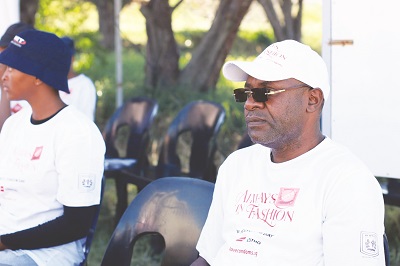By: Thandiwe Kubere
Celebration under the theme “Always in fashion”, AIDS Healthcare Foundation (AHF Lesotho), in partnership with the LDF Health Center and other stakeholders commemorated International Condom Day by educating young people on sexual health and safe sex practices. This took place at LDF Health Center catchment area.
International Condom Day (ICD), created by AHF celebrated each year on February, came about as an innovative and lighthearted way to remind people that wearing a condom can prevent pregnancy and STDs, including HIV. AHF does this by engaging the public in safer sex awareness activities.
The commemorative event this year targeted the youth, particularly those between the ages of 18 to 24, for condom use as a prevention measure against Human Immunodeficiency Virus (HIV), other sexually transmitted diseases (STIs) and unwanted pregnancies. The youth were also educated on the appropriate use of both male and female condoms, encouraging everyone who is sexually active to start and continue using them regularly. Free condoms were also distributed.
The commemorative event did not encourage young people to engage in sexual activities but instead emphasized abstinence while ensuring that their health was not at risk if they chose to engage. AHF Director of Global Advocacy and Partnerships Joey Terrill noted that although condoms are cost-effective methods for preventing HIV, STIs, and unplanned pregnancies, access remains difficult for millions worldwide. He advised that governments, international public health agencies, NGOs, and individuals to work together towards increased accessibility through affordable packaging along with consistent use to reduce new HIV infections.
Accordingly, AHF Lesotho Medical Director Patrick Kanyema enlightened attendees about the country’s progress regarding HIV/AIDS reduction targets set out by UNAIDS; currently reaching 92% of the target goal. This means that 92% of Basotho know their status; among those who do know their status-90% are on antiretroviral therapy (ARV) treatment while also having viral load suppression rates above 90%. According to Centers for Disease Control and Prevention (CDC), ARVs can reduce viral loads within one’s blood system significantly which keeps immune systems working effectively thereby preventing illnesses associated with high levels of virus copies within one’s bloodstream.
Kanyema highlighted that this progress is why everyone should contribute toward ending new cases by making sure there is an HIV-free generation by 2030. He called upon society members not only to increase awareness but also accessibility while reducing taxes associated with purchasing condoms. Further stating how carrying them around should be normalized just like our phones since it will aid towards achieving the shared objective-eradicating new cases linked directly or indirectly via unprotected sex acts leading up-to contracting STDs &/or unwanted pregnancy outcomes.
“Today as we are celebrating, it might seem funny to some people and they may ask each why we are celebrating condom’s day. They may ask, ‘Are this people teaching our children to behave badly or what?’ But that is not true. We need to raise awareness of safer sexual activities because it is part of life”, he said.
He also asserted that people often associate those who talk about condoms with not being street smart because of the myths and misconceptions about it, which is not the case. Some of the myths include statements like, “Condoms are uncomfortable”, when in fact it is advised that if using a condom hurts, attention to the ingredients, the amount of lube one is using, and how the condom fits (size) should be paid attention to.
“Condoms may look small, but they can save us from so many complications. So what I am going to tell you today is that have NONE without condom. AHF Lesotho is sending a message to the whole community, but mostly to the youth because you are our future, say no without condom because it will protect you from many infections and especially from teen pregnancies”, expressed Kanyema.
He enlightened that a call has been made to implementing partners to back-up the Ministry of Health’s agenda. So, they will need everyone’s’ contribution towards achieving the mission of an HIV free nation.
Professional counsellor Malehloa Morojele added that raising awareness is important because most young people often come to facilities when they already have unplanned pregnancies. “You find that due to this reason, they have to drop out of school to care for babies they were not ready for, and it is not right”, she said. Morojele therefore, encouraged them to pay special attention to all that was taught and make right life choices.
Representing youth, Kekeletso Molefi from Thetsane High School declared abstinence is the safest way to protect oneself from getting infected. “High School education should consider a program that bridges the gap between sex comprehension and abstinence, providing important information such as contraception, and practicing safe sex. Parents and community members should also be made a part of such programs.
UNAIDS is leading the global effort to end AIDS as a public health threat by 2030 as part of the Sustainable Development Goals. It released a report, ‘The Path that Ends AIDS’, which contains data and case studies which highlight that ending AIDS is a political and financial choice, and that the countries and leaders who are already following the path are achieving extraordinary results.
Countries like Botswana, Eswatini and Rwanda, have already achieved the “95-95-95” targets. That means 95% of the people who are living with HIV know their HIV status, 95% of the people who know that they are living with HIV being on lifesaving antiretroviral treatment, and 95% of people who are on treatment being virally suppressed.


